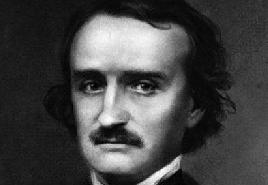Fourth Sunday in Ordinary Time at Mississippi Abbey
[Scripture Readings: Jer 1:4-5, 17-19; 1 Cor 13:4-13; Lk 4:21-30]
 Edgar Allan Poe begins one of his horror stories with this foreboding promise: “The thousand injuries of Fortunato I had borne as best I could, but when he ventured on insult I vowed revenge.“1 The terrible end of Fortunato is foreshadowed in this dramatic beginning. A nobleman, named Montresor, tells of the carnival night he took his revenge by luring the unsuspecting Fortunato deep down into the wine cellars of the vaults under his palazzo to sample a rare and valuable wine. Drinking along the way through the caverns, they recall his family coat of arms showing a huge foot crushing the head of a snake under the motto, “No one attacks me with impunity.” The unfortunate Fortunato, by now suitably intoxicated, comes to a catacomb in the wine cellars where the avenger quickly chains him to the wall and begins closing the narrow crypt with stones until it is sealed tight, ignoring the poor man’s cries for mercy. Sadly, the noble Montressor got away with murder.
Edgar Allan Poe begins one of his horror stories with this foreboding promise: “The thousand injuries of Fortunato I had borne as best I could, but when he ventured on insult I vowed revenge.“1 The terrible end of Fortunato is foreshadowed in this dramatic beginning. A nobleman, named Montresor, tells of the carnival night he took his revenge by luring the unsuspecting Fortunato deep down into the wine cellars of the vaults under his palazzo to sample a rare and valuable wine. Drinking along the way through the caverns, they recall his family coat of arms showing a huge foot crushing the head of a snake under the motto, “No one attacks me with impunity.” The unfortunate Fortunato, by now suitably intoxicated, comes to a catacomb in the wine cellars where the avenger quickly chains him to the wall and begins closing the narrow crypt with stones until it is sealed tight, ignoring the poor man’s cries for mercy. Sadly, the noble Montressor got away with murder.
 It’s a shocking and vengeful story of one man’s inhumanity to another. We shudder at this capacity for cruelty, knowing that through the window of fiction we are looking at the terrible reality of evil in our world. It’s not what we want to hear on a bright Sunday morning when we come together to pray, is it? But today’s story of Jesus at Nazareth is equally shocking.
It’s a shocking and vengeful story of one man’s inhumanity to another. We shudder at this capacity for cruelty, knowing that through the window of fiction we are looking at the terrible reality of evil in our world. It’s not what we want to hear on a bright Sunday morning when we come together to pray, is it? But today’s story of Jesus at Nazareth is equally shocking.
However, our familiarity with the Gospel desensitizes us, dulls our sense of horror at what happened right here at the beginning of Jesus’ public ministry. The violence of Jesus’ own neighbors foreshadows the terrible cruelty of Jesus’ crucifixion. The last week of his life is already previewed on this first day of his preaching at Nazareth. The Palm Sunday shouts of “Hosanna to the Son of David” that will turn into cries for crucifixion are present here in the synagogue of his own town. At first all speak well of him. They wonder at the gracious words that proceed from his mouth, until he pulls aside the veil and uncovers the evil within them. At once they rise up with cries of wrath and rush upon Jesus to hurl him down headlong from the brow of the precipice at Nazareth. Mary, his mother, must have been there with a sword piercing her heart just as she would be there at the foot of the cross. But her neighbors didn’t get away with it, not yet.
 The insults with which the unfortunate Fortunato attacked Montresor with an impunity that could not be borne, incited a terrible revenge. But in Jesus, the people of Nazareth meet a Physician who lances their sores not to insult them but to heal them, and they react with murderous intent, unable to bear the fuller’s soap that would wash them clean, or the refiner’s fire that would purify them like silver and gold. We must shudder at this foreboding story that will end with Jesus nailed to the cross. But thank goodness Jesus’ death was not the end of the story. Unlike Fortunato who remained entombed in his catacomb, Jesus will leave the cave of his tomb at Easter, totally triumphant over death. And here at Nazareth, Jesus foreshadows his resurrection and ascension when he passes unbound through the midst of his countrymen on top of the hill and leaves them to ponder the mystery of who he really is.
The insults with which the unfortunate Fortunato attacked Montresor with an impunity that could not be borne, incited a terrible revenge. But in Jesus, the people of Nazareth meet a Physician who lances their sores not to insult them but to heal them, and they react with murderous intent, unable to bear the fuller’s soap that would wash them clean, or the refiner’s fire that would purify them like silver and gold. We must shudder at this foreboding story that will end with Jesus nailed to the cross. But thank goodness Jesus’ death was not the end of the story. Unlike Fortunato who remained entombed in his catacomb, Jesus will leave the cave of his tomb at Easter, totally triumphant over death. And here at Nazareth, Jesus foreshadows his resurrection and ascension when he passes unbound through the midst of his countrymen on top of the hill and leaves them to ponder the mystery of who he really is.
If Edgar Allan Poe had written the ending of the story about violence against Jesus, we could expect him to devise a great act of retaliation by Jesus crushing his enemies underfoot with impunity. But Jesus came to bring glad tidings to the poor, liberty to captives, sight to the blind, and freedom for the oppressed. He came not to do harm but to heal, not to destroy but to save, not to take revenge but to conquer by love, as Abraham Lincoln understood so well.
 From his earliest days in politics, Lincoln had a critic, an enemy, who continually treated him with contempt, a man by the name of Edwin Stanton. Stanton told newspaper reporters that Lincoln was a “low cunning clown” and “the original gorilla.” He said it was ridiculous for explorers to go to Africa to capture a gorilla “when they could easily find one in Springfield, Illinois.” Lincoln never responded to these insults; he never retaliated in the least. And when, as President, he needed a Secretary of War, he chose Edwin Stanton. His friends asked why. Lincoln replied, “Because he is the best man for the job.” Years later, that fateful night came when an assassin’s bullet struck down President Lincoln in Ford’s theater, Lincoln was carried to the Peterson house across the street. Stanton came, and looking down upon the silent, rugged face of his dead President, he said through his tears, “There lies the most perfect ruler of men the world has ever seen.” Lincoln destroyed his enemy by making him his friend with patient, long-suffering, non-vengeful love.2
From his earliest days in politics, Lincoln had a critic, an enemy, who continually treated him with contempt, a man by the name of Edwin Stanton. Stanton told newspaper reporters that Lincoln was a “low cunning clown” and “the original gorilla.” He said it was ridiculous for explorers to go to Africa to capture a gorilla “when they could easily find one in Springfield, Illinois.” Lincoln never responded to these insults; he never retaliated in the least. And when, as President, he needed a Secretary of War, he chose Edwin Stanton. His friends asked why. Lincoln replied, “Because he is the best man for the job.” Years later, that fateful night came when an assassin’s bullet struck down President Lincoln in Ford’s theater, Lincoln was carried to the Peterson house across the street. Stanton came, and looking down upon the silent, rugged face of his dead President, he said through his tears, “There lies the most perfect ruler of men the world has ever seen.” Lincoln destroyed his enemy by making him his friend with patient, long-suffering, non-vengeful love.2
 It is the same love that motivated our Trappist brother, Dom Christian, the Prior of Our Lady of Atlas monastery in Tibherine, Algeria. He writes, “I have lived long enough to know that I am an accomplice in the evil which seems, alas, to prevail in the world, even in that which would strike me blindly. I should like, when the time comes, to …beg forgiveness of God and of all my fellow human beings, and to forgive with all my heart the one who would strike me down. … you the friend of my final moment, … I say this thank you and this a-Dieu to you in whom I see the face of God. And may we find each other, happy good thieves, in Paradise, if it pleases God, the Father of us both. Amen! In sh’ Allah!“3
It is the same love that motivated our Trappist brother, Dom Christian, the Prior of Our Lady of Atlas monastery in Tibherine, Algeria. He writes, “I have lived long enough to know that I am an accomplice in the evil which seems, alas, to prevail in the world, even in that which would strike me blindly. I should like, when the time comes, to …beg forgiveness of God and of all my fellow human beings, and to forgive with all my heart the one who would strike me down. … you the friend of my final moment, … I say this thank you and this a-Dieu to you in whom I see the face of God. And may we find each other, happy good thieves, in Paradise, if it pleases God, the Father of us both. Amen! In sh’ Allah!“3
St. Bernard expresses it so well in his treatise On Loving God when he writes, “Love seeks no cause beyond itself … I love because I love; I love in order that I may love.“4 In Jesus our thousands of injuries and insults against God are wiped away by love. He offers us the gift of that most rare and valuable consecrated wine, his own Body and Blood, not to lure us into a trap, but to lure us into heaven if only we will follow. And we have come here today to receive this cup with grateful hearts, to taste how sweet and forgiving the Lord is who calls us to share in the wide expanse of his infinite divinity.
